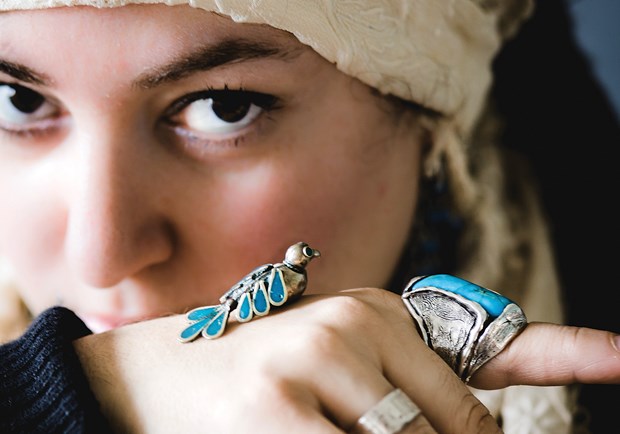Farnaz Ohadi: Album launch for Bird Dance, Saturday, Oct. 1 at 8 p.m. at the BlueShore Financial Centre for the Performing Arts at Capilano University. Tickets, $35/$45, visit tickets.capilanou.ca.
Persian flamenco singer Farnaz Ohadi’s debut album was a lifetime in the making.
The release, entitled Bird Dance, traces the musician’s journey starting with her early life in Iran, where she was born and raised, experiences after moving to Canada as a teenager, and finally, as an adult, finding her voice. Both lyrically, as well as musically, the album reflects her diverse experiences and musical interests, bringing together two genres that have long spoken to her and now, through her creative approach in her music, can finally speak to others.
Growing up, music was an important part of the 42-year-old Vancouver resident’s life.
She started studying piano at age five and, “The older I got, the more it became my salvation. All the angst and anxieties of teenagehood, it was just fantastic to have the piano.
When things were really hard outside, I would just come home and play,” says Ohadi, the founder of the Mashregh Ensemble, an ongoing collaborative project merging flamenco music with the lyrics of Persian poetry and storytelling.
Moving to Toronto, Ont., at age 17, and then Vancouver in 1996, Ohadi maintained her interest in music, and has continued to study a variety of genres and work with countless talented artists over the years, ranging from further piano study to operatic voice training, and exposure to traditional Persian instrumentation and folk singing.
Flamenco entered her life in 1998, seeing her first begin to study dancing in 1998 and then singing in 2005. After a few years of performing regularly in that genre, in 2012 Ohadi felt compelled to do something different, to push herself forward artistically. “I was thinking that I either had to go to Spain to really pursue this and really be immersed in the culture or try to do something different. I arrived at the idea that I’m not from Spain, I don’t live there. I’m not Spanish and I don’t live in Iran anymore either – it is my culture but it’s not really my home anymore. So what if I did something that neither the Spaniards can do and neither the Iranians can do and me as a Canadian can do and that is because I’ve been immersed in flamenco and Persian culture for so long? What if I tried to combine the two?”
In some ways the idea seemed very natural and in others crazy, she says. It seemed natural because there are many similarities between flamenco and Persian music, for example, some flamenco “palos,” or forms, have the same complicated rhythms and nuances as those in Persian music. “Rhythmically they’re not that different. Accents are placed in different places, but ideas that are expressed musically in Persian music and flamenco are very similar, and approaches to singing,” she says.
What seemed crazy was the challenge of fitting the Persian language into flamenco music, all the while staying true to both genres. Ohadi called upon the talents of local Persian classical music vocalist Tahere Falahati for advice, and later flamenco guitarist Liron Man, who she went on to form a longstanding musical partnership with.
“It was the beginning of this marriage working. (Man) was very intrigued and we started working together and he added his own touches to the music,” she says.
Ohadi and Man played their first concert in 2014. “That was the first time that officially I felt like this was really worthy of capturing and recording and it took us another two years to really, really hone it down and work on the mixes and work on the language,” she says.
Man served as musical director and composer on Bird Dance, which features some original songs by the duo, and melodies based on traditional flamenco rhythms, as well as draws from instrumentation from both the flamenco and Persian traditions. The record’s Farsi lyrics are sourced from a range of well-known Persian poets.
“The highest compliment for me is when I hear someone say, ‘It sounds like it’s in Spanish,’ or ‘It sounds like you’re singing Farsi, but you’re just singing this other melody that I have no idea what you’re playing,’ because they don’t know flamenco. Everybody’s able to hear what they need to hear in it, which to me is a really high compliment, thinking that it’s a natural fit,” she says.
Ohadi hopes Bird Dance, which, from beginning to end, tells aspects of her life story, serves as an album of empowerment for women.
“It traces the outlines, the experiences I’ve had as a woman growing up in Iran as a female, not being able to sing as a soloist,” she says. While things are changing, “At the time that I was growing up it was not in my farthest dreams that I could actually be a singer of any kind.”
The first song on the album, its title track, “talks about the idea of a bird that’s caught in a cage and sings anyway because that’s the nature of the bird,” she says.
Subsequent songs trace the trajectory of her movement from Iran to Canada, issues and anxieties about immigration, settling into Canada and finding her place thanks to her art, and looks at her life right now. Having found her voice, she calls on others to join her in her joy.
“I’ve been given this wonderful opportunity to do something like this and now I have responsibilities to make sure that I still look back and acknowledge where I’ve come from and the journey that I’ve taken,” she says.



